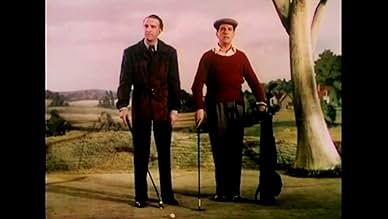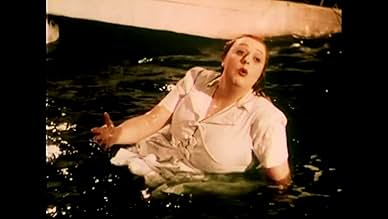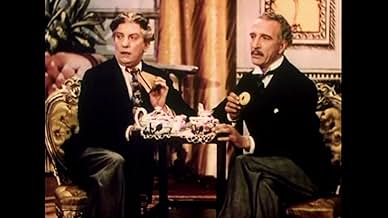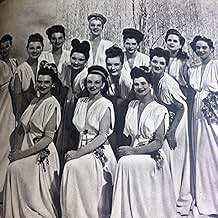Aggiungi una trama nella tua linguaAn aging music-hall performer returns to London believing he's the star of a new show. When he discovers that he's only slated to be the understudy, his daughter sabotages the revue's star i... Leggi tuttoAn aging music-hall performer returns to London believing he's the star of a new show. When he discovers that he's only slated to be the understudy, his daughter sabotages the revue's star in order to get him back into the spotlight.An aging music-hall performer returns to London believing he's the star of a new show. When he discovers that he's only slated to be the understudy, his daughter sabotages the revue's star in order to get him back into the spotlight.
Lucas Hoving
- Dancer
- (as Lucas Hovinga)
Scotty McHarg
- Bill
- (as 'Scotty' McHarg)
Recensioni in evidenza
Now that the full film is finally available on DVD, complete with the deleted scenes restored in the right order, the film is no longer to be seen as such a turkey. It lost money, embarrassed it's backer's, affected careers, and was badly directed by Wesley Ruggles, brought in at Sid Fields request. It still suffers from a missing laughter track in some sketches, and due to his sudden demise, few know Sid Fields huge reputation as a top comic. Rank tore the film apart in efforts to get it through the US censor system, added the cost of the rebuild of Shepperton to the bills, and restricted the distribution to the UK at first. The film is not bad, just disjointed in places, with a poor story line, but the musical numbers work fine. Sid Fields routines are flat because there is no audience roaring with mirth at his every prat fall and joke. The 1980's issue made things worst, with numbers chopped and altered in order, making it a mess from start to finish. But now restored, even the joke apology ending, and re-ordered, it works as a fine nostalgic look at a 1940's review show, in excellent colour, and now very pristine look. Kay Kendal said it ruined her career, yes, but because it stalled at the US box office, not because it was bad, after all it did good business in the UK when new. She had been slated for stardom before the film, and lots of publicity was given , that backfired when they could not sell it to the US distributors, leaving her career in limbo.
Interesting today mainly as a historical record of the Music Hall (Vaudeville to our American cousins), this is fairly slow and unfunny when not actually showing the performances.
Featuring Sid Field, a big star of the thirties and forties. He had a pleasant light singing voice but his act included a Golf Lesson routine not in the class of his namesake, W.C. Two-ton Tessie O'Shea, literally a big star, showed that she had lots of personality and there's an enjoyable Pearlie Kings act with `Any Old Iron?' etc.
Surprisingly in (pretty gaudy) colour.
Featuring Sid Field, a big star of the thirties and forties. He had a pleasant light singing voice but his act included a Golf Lesson routine not in the class of his namesake, W.C. Two-ton Tessie O'Shea, literally a big star, showed that she had lots of personality and there's an enjoyable Pearlie Kings act with `Any Old Iron?' etc.
Surprisingly in (pretty gaudy) colour.
Rank's ruinously expensive attempt to make a film star out of West End sensation Sid Field immediately acquired legendary status when it crashed and burned with both critics and at the boxoffice taking with it the career of director Wesley Ruggles and setting back that of Kay Kendal for several more years.
Predating British film comedies of the fifties and sixties which showcased British television comedians in Technicolor, like most really bad films the biggest sin 'London Town' commits is the one of simply being very dull, to the extent that for the next fifteen years it was produced as Exhibit 'A' whenever the case was argued that the British simply couldn't make musicals.
Predating British film comedies of the fifties and sixties which showcased British television comedians in Technicolor, like most really bad films the biggest sin 'London Town' commits is the one of simply being very dull, to the extent that for the next fifteen years it was produced as Exhibit 'A' whenever the case was argued that the British simply couldn't make musicals.
Petula Clark stars as a young girl in this confused (post-modernist ?) musical, with a whole cast of down-on-their-luck stars producing a variety of songs on some very expensive sets that don't seem to _quite_ make sense.
There is evidence of much cutting, particularly in the 'gay' scene (well that's what it looked like to me) which cuts out and runs out of true, but also with the fact that the story is often incoherent and introduces unexplained new elements (such as 'The Amsted Way' ??).
The comedy act at the end is terrible, and the lead is as well.
Wildly expensively made in Technicolour, perhaps as an experiment ? (Maybe that's why J. Arthur kept in black & white for so long).
There is evidence of much cutting, particularly in the 'gay' scene (well that's what it looked like to me) which cuts out and runs out of true, but also with the fact that the story is often incoherent and introduces unexplained new elements (such as 'The Amsted Way' ??).
The comedy act at the end is terrible, and the lead is as well.
Wildly expensively made in Technicolour, perhaps as an experiment ? (Maybe that's why J. Arthur kept in black & white for so long).
For the first few scenes I couldn't understand why this production had a bad name: the film was interesting, engaging, affectionate -- even funny. Sid Field's impromptu staging of "You Can't Keep A Good Dreamer Down" (evidently a domestic bed-time tradition) is very enjoyable, and the segue into the dream sequence which ends with him arriving on the stage of the theatre -- and waking up! -- is ingenious and well done. Even if nowadays the rooftop dance carries inevitable echoes of "Mary Poppins", these can scarcely be laid at the door of a 1946 production.
At the theatre the first of the film's plot revelations proves equally effective, and the important sparring relationship is established between the show's lead comedian, hypochondriac Charlie De Haven, and its producer, the elegant Mrs Barry. In fact, as long as the action stays behind the scenes it doesn't go far wrong, though the vagaries of the plot mean that Kay Kendall is rarely seen out of the heavy stage make-up which makes her look older and harder than her nineteen years, and her romantic relationship with Jerry Ruggles, the hero, is a bit arbitrary.
It's unclear why stage star Sonnie Hale was engaged to play the rival comedian, since the plot never actually allows us to see the character's stage performance. However, the part makes good use of his acting talents, especially in scenes with Mrs Barry (a glamorous Greta Gynt) and with Charlie's long-suffering dresser Belgrave (an outstanding turn from Claude Hulbert), and acid put-downs against the unfortunate Jerry are deployed to entertaining effect. Jerry Desmonde (Sid Field's real-life 'straight man') also makes a favourable impression as urbane George, the other half of the act.
And while it's always risky to rely on child actors to play a pivotal part in the plot, Petula Clark is note-perfect here as Jerry's daughter. In the absence of a mother-figure (the former Mrs Ruggles evidently long deceased) the two of them form a convincingly close unit, with the little girl alternately managing her father with a briskly adult air or engaging in mutually childish behaviour. Her trips to the joke-shop are adroitly established before it turns out to be crucial to the outcome of the story, and Petula Clark does a brilliant job of depicting her increasingly uneasy conscience as she realises that her prank on Charlie has had more serious consequences than she had ever intended. (The film rose somewhat in my estimation as a result of this: most comedies of this genre would just sweep the issue under the carpet on the grounds that anyone who is unpleasant to the hero deserves anything he gets...)
Sid Field himself is perfectly adequate as Jerry, although with hindsight I do feel that he and Kay Kendall are rather overshadowed by the strong supporting cast -- but my main complaint against Sid Field would be that, as a comedian, his act simply didn't entertain me at all.
A large chunk of the running-time of "London Town" is taken up with either musical production numbers or comedy sketches, representing the material being performed on stage by the cast. The musical numbers start off reasonably entertaining -- "My Heart Goes Crazy" is a generic springtime number with a nice ironic touch -- but seemed to get more tedious as they went on. Either my patience was decreasing, or the (American) director and song-writers' idea of 'London' got harder and harder to swallow as it got into more and more clichéd and unconvincing territory. Meanwhile, the comedy sketches, which are supposedly an irreplaceable record of Field's stage act, are presented in a straight-through-the-proscenium-arch format and a dead soundtrack that kills whatever amusement value they may have had in the first place.
I have to admit that on the basis of this film I don't 'get' Sid Field as a comedian at all. Fast-talking Max Miller is amusing in the pre-war "Friday the Thirteenth" and "The Good Companions", as is Sonnie Hale himself with partner Jessie Matthews in "First a Girl". Field's own act seems to rely on relentless repetition to ensure that even those 'at the back of the gallery' will eventually follow the joke, coupled with a comedy based around errors, failures and ineptitude, a style that I'm afraid I've always personally disliked. The infamous 'photographer' sketch with its blatantly homosexual overtones is probably the funniest, mainly because the humour is character-based (the client complaining pettishly 'But I've always wanted to see his kitchen!') rather than revolving around slapstick or laboured misinterpretations.
But the film has other issues, among them clumsy sound-track editing and lip-synch, and some very fake outdoors scenery: bizarrely, it also contains some beautiful location work that not only provides an invaluable Technicolor archive record of the River Thames on a sunny summer's day but demonstrates a rather more subtle sense of humour into the bargain. (Keep an eye out for the sly social observations concerning the holiday-makers in the boats...)
The full-length release of "London Town" is currently available for free viewing at the NFT 'Mediatheque', split into a 90-minute and a 35-minute section due to limitations on maximum viewing length: this makes it all the more obvious, alas, that the plot is effectively over after ninety minutes! There is actually a good deal to like in this production: it's just that the most successful parts of the film are not those which were intended to sell it as a grandiose post-war celebration. Keep the existing story, strip out and/or replace almost all the on-stage stuff, and you'd probably get an entertaining and unassuming seventy-minute picture. As a two-hour spectacle it is hopelessly overblown.
At the theatre the first of the film's plot revelations proves equally effective, and the important sparring relationship is established between the show's lead comedian, hypochondriac Charlie De Haven, and its producer, the elegant Mrs Barry. In fact, as long as the action stays behind the scenes it doesn't go far wrong, though the vagaries of the plot mean that Kay Kendall is rarely seen out of the heavy stage make-up which makes her look older and harder than her nineteen years, and her romantic relationship with Jerry Ruggles, the hero, is a bit arbitrary.
It's unclear why stage star Sonnie Hale was engaged to play the rival comedian, since the plot never actually allows us to see the character's stage performance. However, the part makes good use of his acting talents, especially in scenes with Mrs Barry (a glamorous Greta Gynt) and with Charlie's long-suffering dresser Belgrave (an outstanding turn from Claude Hulbert), and acid put-downs against the unfortunate Jerry are deployed to entertaining effect. Jerry Desmonde (Sid Field's real-life 'straight man') also makes a favourable impression as urbane George, the other half of the act.
And while it's always risky to rely on child actors to play a pivotal part in the plot, Petula Clark is note-perfect here as Jerry's daughter. In the absence of a mother-figure (the former Mrs Ruggles evidently long deceased) the two of them form a convincingly close unit, with the little girl alternately managing her father with a briskly adult air or engaging in mutually childish behaviour. Her trips to the joke-shop are adroitly established before it turns out to be crucial to the outcome of the story, and Petula Clark does a brilliant job of depicting her increasingly uneasy conscience as she realises that her prank on Charlie has had more serious consequences than she had ever intended. (The film rose somewhat in my estimation as a result of this: most comedies of this genre would just sweep the issue under the carpet on the grounds that anyone who is unpleasant to the hero deserves anything he gets...)
Sid Field himself is perfectly adequate as Jerry, although with hindsight I do feel that he and Kay Kendall are rather overshadowed by the strong supporting cast -- but my main complaint against Sid Field would be that, as a comedian, his act simply didn't entertain me at all.
A large chunk of the running-time of "London Town" is taken up with either musical production numbers or comedy sketches, representing the material being performed on stage by the cast. The musical numbers start off reasonably entertaining -- "My Heart Goes Crazy" is a generic springtime number with a nice ironic touch -- but seemed to get more tedious as they went on. Either my patience was decreasing, or the (American) director and song-writers' idea of 'London' got harder and harder to swallow as it got into more and more clichéd and unconvincing territory. Meanwhile, the comedy sketches, which are supposedly an irreplaceable record of Field's stage act, are presented in a straight-through-the-proscenium-arch format and a dead soundtrack that kills whatever amusement value they may have had in the first place.
I have to admit that on the basis of this film I don't 'get' Sid Field as a comedian at all. Fast-talking Max Miller is amusing in the pre-war "Friday the Thirteenth" and "The Good Companions", as is Sonnie Hale himself with partner Jessie Matthews in "First a Girl". Field's own act seems to rely on relentless repetition to ensure that even those 'at the back of the gallery' will eventually follow the joke, coupled with a comedy based around errors, failures and ineptitude, a style that I'm afraid I've always personally disliked. The infamous 'photographer' sketch with its blatantly homosexual overtones is probably the funniest, mainly because the humour is character-based (the client complaining pettishly 'But I've always wanted to see his kitchen!') rather than revolving around slapstick or laboured misinterpretations.
But the film has other issues, among them clumsy sound-track editing and lip-synch, and some very fake outdoors scenery: bizarrely, it also contains some beautiful location work that not only provides an invaluable Technicolor archive record of the River Thames on a sunny summer's day but demonstrates a rather more subtle sense of humour into the bargain. (Keep an eye out for the sly social observations concerning the holiday-makers in the boats...)
The full-length release of "London Town" is currently available for free viewing at the NFT 'Mediatheque', split into a 90-minute and a 35-minute section due to limitations on maximum viewing length: this makes it all the more obvious, alas, that the plot is effectively over after ninety minutes! There is actually a good deal to like in this production: it's just that the most successful parts of the film are not those which were intended to sell it as a grandiose post-war celebration. Keep the existing story, strip out and/or replace almost all the on-stage stuff, and you'd probably get an entertaining and unassuming seventy-minute picture. As a two-hour spectacle it is hopelessly overblown.
Lo sapevi?
- QuizThis film was Britain's first major Technicolor musical and also became the most notorious critical and box-office flop of the postwar British cinema and the largest bomb ever for its production company, the famed J. Arthur Rank Organisation.
- Curiosità sui creditiClosing credits: The characters depicted in this photoplay are fictional any similarity to actual persons living or dead is purely coincidental.
- Versioni alternativeUK premiere version (126 mins) UK theatrical release print (95 mins)(shortened, re-edited) US theatrical release print (75 mins)
- ConnessioniFeatured in Saturday Live: Pilot (1985)
- Colonne sonoreYou Can't Keep a Good Dreamer Down
(uncredited)
Music by Jimmy Van Heusen
Lyrics by Johnny Burke
Performed by Sid Field
I più visti
Accedi per valutare e creare un elenco di titoli salvati per ottenere consigli personalizzati
Dettagli
- Data di uscita
- Paese di origine
- Lingua
- Celebre anche come
- My Heart Goes Crazy
- Luoghi delle riprese
- Sound City, Shepperton, Surrey, Inghilterra, Regno Unito(studio: made at Sound City Studios Shepperton England)
- Azienda produttrice
- Vedi altri crediti dell’azienda su IMDbPro
Botteghino
- Budget
- 1.000.000 £ (previsto)
- Tempo di esecuzione2 ore 6 minuti
- Proporzioni
- 1.37 : 1
Contribuisci a questa pagina
Suggerisci una modifica o aggiungi i contenuti mancanti

Divario superiore
By what name was London Town (1946) officially released in India in English?
Rispondi


















